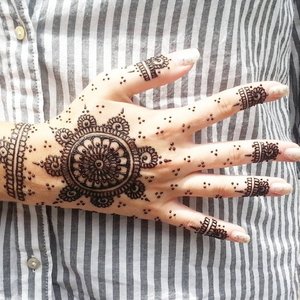http://www.hennapage.com/henna/encyclopedia/kurdjewish/bridalnoh.html
The bride's and groom's families invited people from around the village to "the night of the henna" before the wedding. Invitations to wealthy guests said: "Come to the dyeing in the house of the bride, please cook." This implied that the wealthy should bring food to the wedding. Invitations to poor people specified that they need not bring food to the party.
First, the
bridegroom was hennaed in his home. Then, girls brought the rest of his bowl of henna to the bride's house.
A young girl stirred the henna paste for the bride. Women began by hennaing a little girl to be the decoy for malevolent spirits and the evil eye that might attack the bride. When the child was hennaed, they lifted her onto the bride's lap. Then, women dyed the bride's hair. Next, they hennaed her right hand and left foot, then her left hand and right foot. When the patterns were completed and dried, they wrapped her hennaed hands and feet with cloth strips. In Sinne, they also hennaed patterns on her forehead.
The groom's family and friends brought him to the bride's house, with his hennaed hands and feet wrapped from his night of the henna. The bride and groom wanted to feast at the celebration, because they had to fast the next day. However, with their henna wrappings, they could not feed themselves, so their bridesmaids and groomsmen fed them. When the attendants gave the bride and groom their first bites of food, their friends made a show of trying to steal it, and everyone took a morsel for luck.
The bride and groom slept in their henna wrappings that night, as the party continued. The family and friends stayed up all night to keep demons from harming the couple.
Early the next day, the bride's attendants and female kin bathed her in hot water at her home, then took her to the river before daylight, when at least one star was still visible in the sky, for a ritual bath. The groom sent soap, a washcloth, a comb, rosewater and depilatory, and she dipped herself in the water three times. When the bride had bathed, her friends dressed her. They braided her hennaed hair into long, thin braids, with a silver bell at the end of each. They brought her home purified and veiled, ready to put on wedding clothes and jewels, and have her wedding day.




